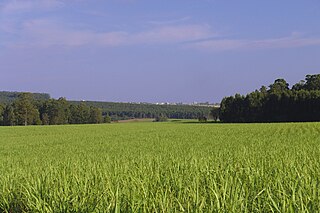
Biofuel is a fuel that is produced over a short time span from biomass, rather than by the very slow natural processes involved in the formation of fossil fuels such as oil. Biofuel can be produced from plants or from agricultural, domestic or industrial biowaste. Biofuels are mostly used for transportation, but can also be used for heating and electricity. Biofuels are regarded as a renewable energy source. The use of biofuel has been subject to criticism regarding the "food vs fuel" debate, varied assessments of their sustainability, and possible deforestation and biodiversity loss as a result of biofuel production.

Biodiesel is a renewable biofuel, a form of diesel fuel, derived from biological sources like vegetable oils, animal fats, or recycled greases, and consisting of long-chain fatty acid esters. It is typically made from fats.

Bioenergy is a type of renewable energy that is derived from plants and animal waste. The biomass that is used as input materials consists of recently living organisms, mainly plants. Thus, fossil fuels are not regarded as biomass under this definition. Types of biomass commonly used for bioenergy include wood, food crops such as corn, energy crops and waste from forests, yards, or farms.
Pyrolysis oil, sometimes also known as biocrude or bio-oil, is a synthetic fuel with few industrial application and under investigation as substitute for petroleum. It is obtained by heating dried biomass without oxygen in a reactor at a temperature of about 500 °C (900 °F) with subsequent cooling, separation from the aqueous phase and other processes. Pyrolysis oil is a kind of tar and normally contains levels of oxygen too high to be considered a pure hydrocarbon. This high oxygen content results in non-volatility, corrosiveness, partial miscibility with fossil fuels, thermal instability, and a tendency to polymerize when exposed to air. As such, it is distinctly different from petroleum products. Removing oxygen from bio-oil or nitrogen from algal bio-oil is known as upgrading.
Neste MY Renewable Diesel is a vegetable oil refining fuel production process commercialized by the Finnish oil and refining company Neste. Whether as an admixture or in its pure form, Neste MY Renewable Diesel is able to supplement or partially replace diesel fuel without problems. Neste MY Renewable Diesel guarantees that every gallon sold meets ASTM D975 and EN 15940 specifications in compliance with OEM standards.

Energy crops are low-cost and low-maintenance crops grown solely for renewable bioenergy production. The crops are processed into solid, liquid or gaseous fuels, such as pellets, bioethanol or biogas. The fuels are burned to generate electrical power or heat.
Renewable Fuels are fuels produced from renewable resources. Examples include: biofuels, Hydrogen fuel, and fully synthetic fuel produced from ambient carbon dioxide and water. This is in contrast to non-renewable fuels such as natural gas, LPG (propane), petroleum and other fossil fuels and nuclear energy. Renewable fuels can include fuels that are synthesized from renewable energy sources, such as wind and solar. Renewable fuels have gained in popularity due to their sustainability, low contributions to the carbon cycle, and in some cases lower amounts of greenhouse gases. The geo-political ramifications of these fuels are also of interest, particularly to industrialized economies which desire independence from Middle Eastern oil.

In the context of energy production, biomass is matter from recently living organisms which is used for bioenergy production. Examples include wood, wood residues, energy crops, agricultural residues including straw, and organic waste from industry and households. Wood and wood residues is the largest biomass energy source today. Wood can be used as a fuel directly or processed into pellet fuel or other forms of fuels. Other plants can also be used as fuel, for instance maize, switchgrass, miscanthus and bamboo. The main waste feedstocks are wood waste, agricultural waste, municipal solid waste, and manufacturing waste. Upgrading raw biomass to higher grade fuels can be achieved by different methods, broadly classified as thermal, chemical, or biochemical.
Biofuel is fuel that is produced from organic matter (biomass), including plant materials and animal waste. It is considered a renewable source of energy that can assist in reducing carbon emissions. The two main types of biofuel currently being produced in Australia are biodiesel and bioethanol, used as replacements for diesel and petrol (gasoline) respectively. As of 2017 Australia is a relatively small producer of biofuels, accounting for 0.2% of world bioethanol production and 0.1% of world biodiesel production.
The Energy Biosciences Institute (EBI) is an organization dedicated to developing new sources of energy and reducing the impact of energy consumption. It was created in 2007 to apply advanced knowledge of biology to the challenges of responsible, sustainable energy production and use. Its main goal is to develop next-generation biofuels—that is, biofuels that are made from the non-edible parts of plants and reduce greenhouse gas emissions.

Vegetable oils are increasingly used as a substitute for fossil fuels. Vegetable oils are the basis of biodiesel, which can be used like conventional diesel. Some vegetable oil blends are used in unmodified vehicles, but straight vegetable oil often needs specially prepared vehicles which have a method of heating the oil to reduce its viscosity and surface tension, sometimes specially made injector nozzles, increased injection pressure and stronger glow-plugs, in addition to fuel pre-heating is used. Another alternative is vegetable oil refining.

Jatropha curcas is a species of flowering plant in the spurge family, Euphorbiaceae, that is native to the American tropics, most likely Mexico and Central America. It is originally native to the tropical areas of the Americas from Mexico to Argentina, and has been spread throughout the world in tropical and subtropical regions around the world, becoming naturalized or invasive in many areas. The specific epithet, "curcas", was first used by Portuguese doc Garcia de Orta more than 400 years ago. Common names in English include physic nut, Barbados nut, poison nut, bubble bush or purging nut. In parts of Africa and areas in Asia such as India it is often known as "castor oil plant" or "hedge castor oil plant", but it is not the same as the usual castor oil plant, Ricinus communis.
Second-generation biofuels, also known as advanced biofuels, are fuels that can be manufactured from various types of non-food biomass. Biomass in this context means plant materials and animal waste used especially as a source of fuel.
Biogasoline is a type of gasoline produced from biomass such as algae. Like traditionally produced gasoline, it is made up of hydrocarbons with 6 (hexane) to 12 (dodecane) carbon atoms per molecule and can be used in internal combustion engines. However, unlike traditional gasoline/petroleum based fuels, which are mainly composed from oil, biogasolines are made from plants such as beets and sugarcane or cellulosic biomass- substances normally referred to as plant waste.
The biofuel sector in the United Kingdom, under the auspices of the government's Renewable Transport Fuel Obligation (RTFO), has been progressing towards enhanced sustainable energy solutions. Marking a significant stride in this direction was the government's endorsement and introduction of E10 biofuel in late 2021. This fuel blend, consisting of 90% regular unleaded gasoline and 10% ethanol, was introduced as part of an initiative to reduce greenhouse gas emissions (GHG) from transport fuels. The introduction of E10 led to a shift in the renewable fuel landscape in the UK, particularly influencing an increase in the utilization of non-waste feedstocks. In the year 2022, the biofuel sector, as per government reports, achieved a reduction in GHG emissions by 82% in comparison to traditional fossil fuels.

Sustainable biofuel is biofuel produced in a sustainable manner. It is not based on petroleum or other fossil fuels. It includes not using plants that are used for food stuff to produce the fuel thus disrupting the world's food supply.
Issues relating to biofuel are social, economic, environmental and technical problems that may arise from biofuel production and use. Social and economic issues include the "food vs fuel" debate and the need to develop responsible policies and economic instruments to ensure sustainable biofuel production. Farming for biofuels feedstock can be detrimental to the environment if not done sustainably. Environmental concerns include deforestation, biodiversity loss and soil erosion as a result of land clearing for biofuels agriculture. While biofuels can contribute to reduction in global carbon emissions, indirect land use change for biofuel production can have the inverse effect. Technical issues include possible modifications necessary to run the engine on biofuel, as well as energy balance and efficiency.
Algenol, founded in 2009, headquartered in Fort Myers, Florida, Algenol is an industrial biotechnology company that is commercializing patented algae technology for production of ethanol and other fuels. The technology enables production four of the most important fuels using a proprietary process involving algae, sunlight, carbon dioxide and salt water.
Carbon-neutral fuel is fuel which produces no net-greenhouse gas emissions or carbon footprint. In practice, this usually means fuels that are made using carbon dioxide (CO2) as a feedstock. Proposed carbon-neutral fuels can broadly be grouped into synthetic fuels, which are made by chemically hydrogenating carbon dioxide, and biofuels, which are produced using natural CO2-consuming processes like photosynthesis.

Carbon capture and utilization (CCU) is the process of capturing carbon dioxide (CO2) from industrial processes and transporting it via pipelines to where one intends to use it in industrial processes.








